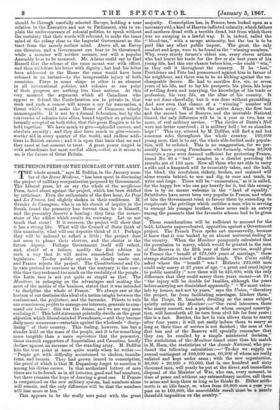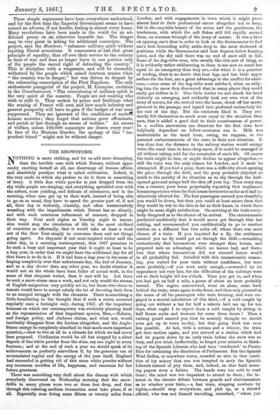THE FRENCH PRESS ON THE INCREASE OF THE ARMY.
" THE whole month," says M. Dollfus, in the January num- ber of the Revue Moderne, "has been spent in discussing the project of military reorganization proposed by Government. The Liberal press, let us say the whole of the onofficious Press, faced about against the project, which has been riddled by criticisms. Even the enthusiasts of the first hour, Le Pays and La France, feel slightly shaken in their confidence. M. Granier de Cassagnac, who is on his circuit of inquiry in the South, found the peasantry less fervent than he is himself, and the peasantry deserve a hearing ; they form the corner- stone of the edifice which awaits its crowning. Let us not touch that stone! If it recovers, the project will show that it has a strong life. What will the Council of State think of this unanimity, what will our deputies think of it ? Perhaps they will be induced to reflect a little ; the project does not seem to please their electors, and the elector is the future deputy. Perhaps Government itself will reflect, and, afraid of a failure, modify the first edition in such a way that it will arrive remodelled before our legislators. To-day public opinion is clearly made out, and France rejects the project. The Constitutionnel and Co. in vain pretend to convince us that the contrary is the case ; this time theyreckoned too much on the credulity of the people ; the Latin race is not yet quite so stupid as that. The Moniteur, in enlarging on the advantages and making the most of the merits of the business, stated that it was intended to discipline the whole of France.' We always saw at the horizon of our destinies this ideal of a nation caught between the confessional, the prefecture, and the barracks. Priests to rule our consciences, prelets to manage our interests, generals to com- mand our bodies : this was the dream, and we are very near realizing it." This bold statement pointedly dwells on the great objection which liberal-minded Frenchmen,—and they become daily more numerous—entertain against the wholesale " discip- lining " of their country. This feeling, however, has but a slender hold on the mass of the people, and it is for something more tangible than a mere aspiration that the peasantry, those staunch supporters of Imperialism and Cassarism, loudly declare against an increase of the standing army. M. Dollfus bits the true point at issue quite neatly when he writes :— " People get with difficulty accustomed to cholera, inunda- tions, and locusts. They had grown inured to conscription, the proof of which is that M. Dupanloup forgot to mention it among his divine curses. In that authorized lottery of men there are to be found, as in all lotteries, good and bad numbers, but there remains the hope of drawing a good one. If France is reorganized on the new military system, bad numbers alone will remain, and the only difference will be that the numbers will lose more or less."
This appears to be the really sore point with the great majority. Conscription has, in France, been looked upon as a necessary evil, a kind of Heaven-inflicted calamity, which fathers and mothers dread with a terrible dread, but from which there was no escaping in a lawful way. It is, indeed, called the "blood-tax," with a savage animosity, but the tax is to be paid like any other public impost. The great, the only comfort and hope, were to be found in the "winning numbers." Why, every sturdy farmer's eldest son, every clever artisan who had learnt his trade for the five or six best years of his young life, had this one chance before him,—he could "win," as they call it throughout the country. If he "lost," Providence and Fate had pronounced against him in favour of his neighbour, and there was to be no kicking against the un- changeable decree. He had to sacrifice five, six, or seven years of his life, and to lay his prospects, his plans, his hope of settling down and marrying, the knowledge of his trade or profession, his very life, on the altar of his country. It was not done cheerfully, but it was done without grumbling. And now even that chance of a " winning " number will be taken away. What with the active Army, the first ban 'and the second ban of Reserve, and the moveable National Guard, the only difference will be in a year or two, less or more, of real military service. "The circles of Dante's Hell were not better contrived ; it is military hell ; let us abandon hope !" This cry, uttered by M. Dollfus, will find a sad but sonorous echo throughout the whole country. 160,000 young men, that is to say, the whole able-bodied male popula- tion, will be enlisted. This is no exaggeration, for we per- sonally know young Frenchmen who formerly, when 80,000 conscrits a year were deemed sufficient for protecting France, found No. 80 a " bad " number in a district providing 40 recruits out of 110 men. Now all those who are able to carry a rifle and a knapsack will be invariably taken, and the halt, the blind, the scrofulous, rickety, broken, and maimed will alone remain behind, to sow and dig, to cure and teach, to write and forge. There will be "exoneration," as it is called, for the happy few who can pay heavily for it, but this exemp- tion is by no means welcome in the "land of equality." Substitutes have never beep very popular in France, and when of late the Government tried to favour them by extending to remplagants the privilege which entitles a man who is serving- to exempt his younger brother, there arose such an outcry among the peasants that the favourite scheme had to be given up. These considerations will be sufficient to a,ceount for the bold, hitherto unprecedented, opposition against a Government project. The French Press spoke out unreservedly, because it knew that it was backed by an almost universal feeling in the country. When the Afoniteur pompously calculated that the permission to marry, which would be granted to the men of the Reserve in the fifth year of their service, would give to France the "benefit of 675,000 years of marriage," these strange statistics raised a Homeric laugh. The Union coldly asked where the "benefit" -was? Hitherto 225,000 men could only marry at 27 years of age, "a great and cruel injury to public morality ;" now there will be 425,000, with the only difference that they could marry three years sooner—at 24; "the injury will be double for families, although the years before marrying are diminished apparently." "We must calcu- late by homes, and not by years, says the Union, "therefore the project, far from facilitating marriages, hinders them." In the Temps, M. Isambert, dwelling on the same subject, quietly refutes the Aloniteur :—" Our rural labourers, those who marry soonest, and a portion of whom escaped conscrip- tion, will henceforth all be torn from civil life for four years ; this is a fact. Besides, the law in vain allows them to marry after four years ; it will not easily induce them to marry as long as their time of service is not finished ; the men of the first bin and of the Reserve will specially remember that they can be recalled by a simple ministerial decision." The statistician of - thc. Moniteur found more than his match in M. Horn, the statistician of the Avenir National, who pro- duced the following calculation :—" To-day we supply an annual contingent of 100,000 men, 60,000 of whom are really enliiited and kept under arms • with the new organization, 80,000 + 20,000 ± 60,000, that is, one hundred and sixty thousand men, will yearly be put at the direct and immediate .disposal of the Minister of War, who can, every moment, in time of peace and without any extraordinary motive, call them to arms and keep them as long as he thinks fit. Either arith- metic is an idle fancy, or, when from 60,000 men a year you pass on to 160,000, the unavoidable result must be a nearly threefold imposition on the country." These simple arguments have been everywhere understood, and for the first time the Imperial Government seems to have roused an adverse, if not hostile, feeling in almost every home. Illany revolutions have been made in the world for an ad- ditional penny on an otherwise bearable tax. The danger may be very great in asking for additional conscripts. The project, says the Aloniteur, "enhances military spirit without injuring liberal avocations. It consecrates at last that great principle of equality, that all owe their service to the country in time of war, and does no longer leave to one portion only of the people the sacred right of defending the country." This is discipline with a vengeance, and will be staunchly withstood by the people which raised fourteen armies when "the country was in danger," but was driven to despair by the exhausting conscription of the First Napoleon. The only enthusiastic panegyrist of the project, M. Limayrac, exclaims in the Constitutionnel, "The reawakening of military spirit is the very spirit of the country. People are not wanting who wish to stifle it. They reckon by pence and farthings what the arming of France will cost, and how much industry and general prosperity will have to gain if the budget of war were suppressed. They are ignorant of the conditions of modes human societies ; they forget that nations grow effeminate, and perish at last through an excess of welfare." An excess of welfare, unless 160,000 conscripts are drawn every year! In face of the Mexican blunder, the apology of this "mm- prudent friend" might not be without danger.





































 Previous page
Previous page